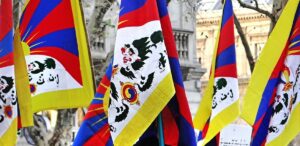
Tibetan Flag
The Guardian published an article on July 22 suggesting that the Indian government is using spyware developed by Israel during their conflict with Saudi Arabia in 2017 to monitor the phones “of a top ring of advisers around the Dalai Lama”. Israel says it only sells the package – NSO Pegasus – to governments.
The article continues, saying that among the phones targeted were those of the former President of the Tibetan Government-in-Exile, Lobsang Sangay, and staff in the office of the Gyalwang Karmapa, in addition to “several other activists and clerics who are part of the exiled community in India”.
The Wire reports, “A massive trove of 50,000 numbers were accessed by French journalism non-profit Forbidden Stories and international human rights advocacy group, Amnesty International. This was then shared with 16 media houses, including The Wire, who investigated the phone numbers of the potential targets”.
Amnesty International’s security lab analysed the data and found traces of “Pegasus or signs of attempted infection”.
The Wire continues, “The phone numbers indicate that the targets may have been selected by an unknown India-based client of the NSO Group. The Indian government has never acknowledged or denied that it has deployed Pegasus software, but University of Toronto’s Citizen Lab had identified India as the location for at least two NSO clients”.
The Guardian suggests that this “may provide a glimpse at the delicate relationship between Tibet’s exiles and the Indian government”, and that it “points to a growing awareness in Delhi, as well as in western capitals, of the strategic importance of Tibet as their relationships with China have grown more tense over the past five years”.
The Guardian speculates, “India could have several motives for possible spying on Tibetan leaders but some in Dharamshala have concluded the question of [the Dalai Lama’s] succession may be a driving force”.

His Holiness the 14th Dalai Lama
China claims the sole right to control the selection process for future Dalai Lamas. The Guardian article reports that analysts say China is “already pressuring neighbours such as Nepal and Mongolia to rule out recognising any successor but its own” and that “Beijing is also contacting influential Buddhist teachers and clerics around the world, including some based in India, inviting them to China to try to lay the groundwork for its choice and muddy support for any candidate chosen by the Dalai Lama’s followers”.
There are implications for Delhi’s own relationship with China. The issue of contact and negotiations between the exile Tibetan government and China appears to be something that India wishes to monitor. Two years ago the Dalai Lama revealed that when he planned to meet Chinese President Xi Jinping during Xi’s visit to India in 2014, India vetoed the meeting. Speaking anonymously to the Guardian, a “former staffer with the Tibetan administration” said, “India is very aware of [the Dalai Lama’s connections with the Chinese leadership] and they want to make sure that no deals are made without their knowing or involvement”.
India has responded that the “allegations regarding government surveillance on specific people has no concrete basis or truth associated with it whatsoever”, and Ashwini Vaishnaw, India’s Information Technology Minister said the claims about Indian surveillance were an “attempt to malign Indian democracy”.
The Guardian concludes, “Delhi officially backs negotiations on the status of Tibet, but a recent Indian thinktank report suggested the country’s intelligence agencies had not always been supportive of the Dalai Lama’s ‘middle way’.”
The NSO has said that a number appearing on the leaked list was “in no way indicative of whether it was selected for surveillance using Pegasus” and that the “numbers in the list are not related to NSO Group in any way”.




 Print
Print Email
Email